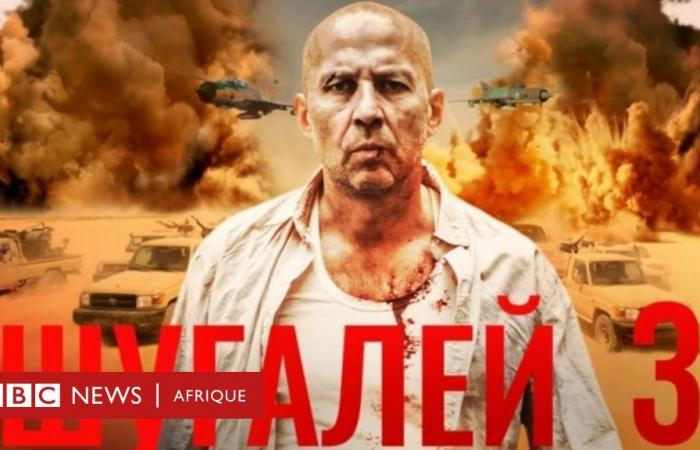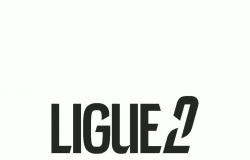Photo credit, YouTube / Aurum Production
- Author, Natasha Booty, Gleb Borshchevskii & Sergei Goryashko
- Role, BBC News
-
9 hours ago
Dodge bullets, avoid explosions, protect state secrets.
Bombastic propaganda films portray shadowy Russian political operative Maxim Shugalei as a heroic figure, seemingly stopping at nothing to promote the country abroad.
While his escapades may have been exaggerated, in reality he played an important role in expanding Russia's influence in parts of Africa, working closely with the Russian mercenary group Wagner.
However, this would-be ironman recently suffered a setback when he was arrested in a central African country, Chad.
He was arrested in September with his Russian colleagues Samer Sueifan and E Tsaryov for unexplained reasons, before being released and returned to his country earlier this month, according to the Russian embassy.
Who is Maxim Shugalei?
Mr Shugalei tends to describe himself as a “sociologist”, but in reality, according to analysts, he is a “spin doctor” and a Russian agent of influence known for his work on the African continent. .
He has been subject to EU sanctions since 2023 for overseeing disinformation campaigns aimed at promoting the Wagner Group in several African countries, and is also subject to Ukrainian sanctions.
Since at least 2010, Shugalei was affiliated with the late Russian businessman Yevgeny Prigozhin, the boss of Wagner and a close associate of President Vladimir Putin.
While Mr. Shugalei used to deny these connections – as was customary in Mr. Prigozhin's circles – he nonetheless attracted media attention for his work and his subsequent arrest in Libya on charges of espionage and interference in elections on behalf of Wagner's boss.
Prigozhin had tasked Shugalei with gathering information and preparing a strategy to support Seif al-Islam Gaddafi, the son of former leader Muammar Gaddafi.
When Shugalei returned to Russia, Prigozhin revealed that he had given him 18 million rubles ($173,000; £138,000) – 1 million rubles for each month he had spent in captivity.
Photo credit, Getty Images
Shugalei's escapades in Libya served as the basis for a trilogy of television action films, apparently sponsored by Prigozhin. These films were intended, among other things, to glorify the regime of Khalifa Haftar, then Wagner's ally, in eastern Libya and to whitewash Russia's activities in Africa.
The role of Shugalei was played by actor Kirill Polukhin, and the films show him as “almost a James Bond figure, or a Mission Impossible guy,” says Ladd Serwat, Africa regional specialist for the Armed Conflict Project Location and Event Data (Acled).
“We are shown a macho, tough person who does not want to crack under pressure or divulge national secrets, but who is quite capable of acting as a mercenary or independent military operator. »
A modest online fan page falsely claims that “Shugalei” has even become an Arabic word meaning “man of iron that cannot be broken.”
But as a key player in Russia's expanding influence in Africa in recent years, he has also been involved in some extraordinary real-life activities.
In 2018, a BBC investigation revealed that he was among several Russian agents caught offering suitcases full of cash to presidential candidates in Madagascar.
There is a striking contrast between the benevolent and saving image projected by the Russian network of influence and the reality on the ground, analysts say.
“Industrial and artisanal miners were attacked or kidnapped by Wagner's mercenaries and driven from areas – such as Ndassima [en République centrafricaine] – where they operated in order to make way for companies linked to Prigozhin,” says Mr. Serwat.
Human rights groups have accused Wagner's fighters of committing horrific atrocities, including a massacre in Mali, the kidnapping and rape of teenage girls, and the massacre of civilians to protect themselves. ensure access to lucrative gold mines.
Before his activities abroad, the only public episode in Mr. Shugalei's career as a political consultant was during the 2002 St. Petersburg parliamentary elections.
At the time, Mr. Shugalei represented one of the candidates and famously ate several documents during an election commission meeting to avoid them being submitted to court.
How influential is Shugalei?
Under Prigozhin, Shugalei was officially the head of the Foundation for the Protection of National Values, a pro-Wagner organization and public relations company.
Unofficially, he worked in various African states to try to ensure that pro-Wagner regimes came to and stayed in power, as part of Russia's attempts to gain influence on the continent – particularly at the expense of France.
Since the death of Evgeniy Prigozhin last year, troops serving under Wagner's banner in Ukraine and Africa have been absorbed into Russia's official military structure.
However, Prigozhin's media empire, of which Shugalei was a part, collapsed.
As he operates in the shadows, it is difficult to know exactly how much influence he has.
However, according to some, Shugalei did not lose too much influence despite the death of his mentor.
“It still appears to have the same level of influence, despite the fact that the Kremlin appears to have taken over the majority of Wagner Group's operations,” says Beverly Ochieng, senior analyst covering French-speaking Africa for Control Risks.
He appears to no longer deny his ties to Wagner and Prigozhin – his Telegram channel is filled with messages commemorating the late oligarch and his mercenary group, and he even reposts Wagner's recruitment information.
However, aside from his arrest in Chad and a trip to Angola in July that he documented on Telegram, it is difficult to know the extent of his current activities.
Photo credit, Getty Images
Why was he arrested in Chad?
Chad has not given an official reason for the arrest of Shugalei and his two associates.
Many theories abound, some more plausible than others.
The Russian state-controlled RT news channel reported that the arrests were instigated by France, but this is most likely a face-saving fiction, Ochieng told the BBC.
Since at least May, Russia has argued that the West's traditional influence in Chad is weakening.
However, although Chad recently signed agreements with Russia on infrastructure and security, it still hosts French troops and maintains good relations with the former colonial power, unlike several of its French-speaking neighbors who are oriented towards Russia.
There is no evidence of a Russian military presence in the country.
In fact, some argue that Chadian President Mahamat Déby is skillfully playing the game of Russia and the West against each other, to Chad's advantage.
Russia is striving to completely dominate West Africa's Sahel region and already has close ties with two of Chad's neighbors: Niger and the Central African Republic (CAR), the country where Russia's influence is the strongest on the continent.
Wagner's fighters reportedly infiltrated Chad from the Central African Republic and clashed with the local army before retreating.
If Russia were able to bring Chad into its orbit, it would create an uninterrupted sphere of influence stretching thousands of kilometers.
Mr. Shugalei had already visited Chad twice and notably met with Mr. Déby's campaign team before the presidential elections in May. He was also linked to the “Russia House” cultural center in the capital, N'Djamena, which recently inaugurated a new headquarters in a ceremony attended by representatives of the Russian government.
Last year, US intelligence said it had discovered that Mr Wagner had orchestrated a plot to assassinate Mr Déby, but did not carry it out.
Mr Serwat suggests this may be why Shugalei was arrested.
According to Ms. Ochieng, Chad may have been concerned about Shugalei's potential to attempt to destabilize the country by spreading disinformation.
Mr. Shugalei's foundation has denied that he is a “Wagner spy,” saying that Mr. Shugalei “knows nothing in particular about the Wagner Group's activities in Africa and only knows general details about what he is doing.” has done before.”
According to analysts, Russian-backed social media content, TV channels and news sites are deployed to spread a pro-Russian agenda and disinformation, particularly in Africa.
Afrique Media TV, for example, broadcasts from Cameroon to the Central African Republic, Ivory Coast, Mali, Burkina Faso and Niger. She is also present on YouTube, where she has thousands of followers, and enjoys great popularity on Facebook.
Shugalei himself flaunts his presence in various African countries, sometimes sharing short, low-budget, vlog-style Telegram videos that clearly show his taste for spectacle.
One of them, titled LionBear, shows a bear (which symbolizes Russia) running across the world to defend a lion (his friend from the Central African Republic) from the harmful influence of hyenas.
“I don't think people are necessarily convinced by these videos – they think it's funny, it's a joke,” Ms Ochieng says.






